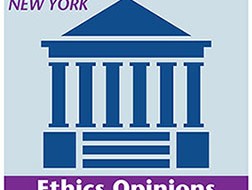Billing for Computer-Assisted Legal Research
By Steven C. Krane [Originally published in NYPRR May 2002]
In September 1991, American Lawyer magazine published what it considered an exposé on the manner in which major law firms billed their clients for various hard costs. The article, entitled “Skaddenomics,” scrutinized the practice of many firms of charging what by any objective standards were exorbitant sums for demonstrably inexpensive items, such as the now celebrated $32 tuna fish sandwich. Instead of billing the actual retail cost of the tuna fish, bread, mayonnaise and other accoutrements, the firms added an allocation of overhead to the cost to take into account, among other things, the salaries and benefits of employees hired to prepare and serve the sandwich in the office, as well as the cost of maintaining an in-house kitchen. Perhaps as a result of the attention garnered by that article, ethics committees around the country began evaluating the propriety of disbursement-and-charge billing practices.
The most celebrated of these efforts was Formal Opinion 93-379 of the ABA Standing Committee on Ethics and Professional Responsibility, released in August 1993. The thrust of the ABA opinion was that all charges, including those for in-house services, should survive ethical scrutiny provided there was adequate disclosure of the methodology used to compute them and if the clients specifically agreed in advance to pay charges so computed. Presumably, if the client agreed in advance to pay $50 for a tuna fish sandwich, or $75 for a ham and cheese, that would be permissible under the ABA opinion. When the opinion was released, I recommended within my own firm that we modify our standard retainer letter (which we have long required for all clients) to refer to an attached schedule of charges. In the absence of an agreement with the client, however, lawyers could not ethically bill more than the direct cost associated with the service plus a reasonable allocation of overhead expenses directly associated with the provision of the service. Ethics opinions from Alaska, Connecticut and Michigan reached similar conclusions, noting that charges are permitted when agreed to by the client, and otherwise must be directly related to hard costs, including reasonable allocations of overhead directly attributable to the service. In other words, charges cannot be used as additional profit centers for a law firm. [See, Alaska Ethics Op. 95-4 (1995); Connecticut Informal Op. 96-3 (1996); Michigan Op. RI-241 (1995).]
In Summer 2000, the American Law Institute published its Restatement of the Law Governing Lawyers. That treatise confirms the state of the law on disbursements as follows:
[U]nless the contract [between attorney and client] construed in its circumstances provides otherwise, a lawyer may not recover from a client payment in addition to the agreed fee for items of general office and overhead expense such as secretarial costs and word processing. A client lacking knowledge of the lawyer’s usual practice cannot be expected to assume that the lawyer will charge extra for such expenses. The lawyer may, however, charge separately for such items if the client was told of the billing practice at the outset of the representation or was familiar with it from past experience with the lawyer or (in the case of a general billing custom in the area) from past experiences with other lawyers.
Restatement, §38, cmt. e (emphasis supplied).
Application to Computer-Assisted Research
Against this backdrop, courts have begun looking askance at lawyers seeking reimbursement of expenses for Computer-Assisted Legal Research (CALR) in addition to legal fees, on the theory that legal research is part of the basic service a lawyer performs. Specifically, courts hold that CALR expenses are an element of legal fees, not a separately compensable cost; some direct that CALR costs be factored into the lawyer ‘s hourly rate. [See, Montgomery v. Aetna Plywood, Inc., 231 F.3d 399, 409-10 (7th Cir. 2000); Standley v. Chilhowee R-IV School Dist., 5 F.3d 319, 325 & n.7 (9th Cir. 1993); White v. Employee Retirement Plan of Amoco Corp., 2001 WL 1204193, at *7 (N.D. Ill. Oct. 10, 2001); Yankee Candle Co. v. Bridgewater Candle Co., 140 F. Supp. 2d 111, 126 (D. Mass. 2001); U & I Sanitation v. City of Columbus, 112 F. Supp. 2d 902, 905-06 (D. Neb. 2000); Beckford v. Irvin, 60 F. Supp. 2d 85, 90 (W.D.N.Y. 1999); Emmenegger v. Bull Moose Tube Co., 33 F. Supp. 2d 1127, 1136-37 (E.D. Mo. 1998); Coleman v. Dydula, 175 F.R.D. 177, 182 (W.D.N.Y. 1997).]
Although some early cases accepted the proposition that CALR creates greater efficiency and lowers the fee charged to clients, see, e.g., Oxford Venture Fund L.P. v. CIT Group/Equipment Financing [1990 WL 176102, at *4 (S.D.N.Y. 1990, Francis, M.J.)], the prevailing view is that the cost of CALR should be added to or included within the legal fees and not charged separately. As the Seventh Circuit held in Montgomery v. Aetna Plywood, Inc.:
The idea is that computer-assisted legal research essentially raises an attorney’s average hourly rate as it reduces (at least in theory) the number of hours that must be billed. As a form of attorneys’ fees, the charges associated with such research are not separately recoverable expenses. [231 F.3d at 409.]
Indeed, a handful of cases have questioned the need for CALR at all. In Coleman v. Dydula, supra, for example, Magistrate Judge Heckman of the Western District of New York disallowed a request for reimbursement of CALR expenses in connection with a motion for expenses incurred in bringing a motion to compel discovery. In so doing, the court wrote:
Defendants claim that Westlaw research was necessary because Mr. Sliwa does not have a complete set of the Federal Rules Decisions at his firm. However, as plaintiffs note, these volumes are available at the State Supreme Court library where the cases could have been printed from CD-ROM at no charge. This court also notes that the library at the Federal Courthouse and the Law Library at the University of Buffalo shelve these volumes as well. This court will not require plaintiffs to pay for an item of convenience for Mr. Sliwa when alternatives were readily available. [175 F.R.D. at 182.]
Importantly, all of these cases arise in the context of applications for fee awards, and nothing in any of them derogates from the continuing validity of the advice in the ABA ethics opinion and in the Restatement that charges are proper if agreed to by the client. Research has uncovered no cases involving a challenge to the propriety of billing for CALR where the client agreed in advance to such a charge. However, in the absence of an express agreement with the client, or a showing of a client’s familiarity with customary attorney billing practices in the community, these decisions confirm the existence of a clear and significant risk that the billing law firm would be unable to recover any CALR charges over a client’s objection.
As with many other ethical problems, the key to avoiding difficulties with charges is full and effective disclosure and client consent. At the very least, engagement letters — now required under 22 NYCRR Part 1215 — should include a listing of any potentially problematic charges and a statement explaining that “[s]ome of the charges include an allocation of over-head expenses directly associated with the provision of the service in question.” Asking the client to signify its acceptance of the billing terms included in the engagement letter will go a long way toward avoiding disputes after bills are rendered. Not only is this ethically advisable, it is sound business practice.
Steven C. Krane is President of the New York State Bar Association. He is a partner in the Litigation & Dispute Resolution Department of Proskauer Rose LLP.
DISCLAIMER: This article provides general coverage of its subject area and is presented to the reader for informational purposes only with the understanding that the laws governing legal ethics and professional responsibility are always changing. The information in this article is not a substitute for legal advice and may not be suitable in a particular situation. Consult your attorney for legal advice. New York Legal Ethics Reporter provides this article with the understanding that neither New York Legal Ethics Reporter LLC, nor Frankfurt Kurnit Klein & Selz, nor Hofstra University, nor their representatives, nor any of the authors are engaged herein in rendering legal advice. New York Legal Ethics Reporter LLC, Frankfurt Kurnit Klein & Selz, Hofstra University, their representatives, and the authors shall not be liable for any damages resulting from any error, inaccuracy, or omission.
Related Posts
« Conflicts of Interest in Patent Practice: Representing Competitors Firm Disqualified for Conflict Between Clients »







